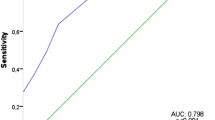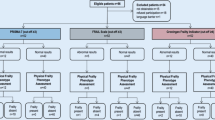Abstract
Objectives
Translate, cross-culturally adapt and validate the Rapid Geriatric Assessment (RGA) for Brazilian community-dwelling adults.
Design
Cross-sectional study, using a quantitative approach.
Setting
Urban population from the city of São Carlos, located in the interior of São Paulo State, Brazil. Participants: 148 individuals aged 60 or over.
Measurements
Participants were assessed using the RGA, Fried Frailty Phenotype, International Physical Activity Questionnaire - long version, Addenbrooke´s Cognitive Exam - Revised Version, Mini Nutritional Assessment, short Form - 36, EuroQol 5-Dimension, Geriatric Depression Scale - short version, in addition to performing Dual Energy X-ray Absorptiometry to diagnose sarcopenia, according to the criteria established by the European Working Group on Sarcopenia in Older People.
Results
In the translation and adaption process of the RGA, steps recommended by the literature were followed: initial translation, synthesis of translations, backward translation, evaluation from the panel of judges, and pre-test. When evaluating the psychometric properties of the scale, satisfactory reliability (internal consistency and stability) and validity (content, concurrent criterion and convergent, divergent and discriminant construct) were verified.
Conclusion
The Brazilian version of the RGA is reliable and valid, and can be used in the Brazilian context to evaluate the elderly population.




Similar content being viewed by others
References
Cesari M, Prince M, Thiyagarajan JA et al. Frailty: An Emerging Public Health Priority. JAMDA 2016;17:188–192
Morley JE, Little MO, Berg-Weger M. Rapid Geriatric Assessment: A Tool for Primary Care Physicians. JAMDA 2017;18:195–199
Moraes EN, Marino MCA, Santos RR. Principais síndromes geriátricas. Revista Médica de Minas Gerais 2010;20:54–66
Morley JE, Adams EV. Rapid Geriatric Assesment. JAMDA 2015;16:808–812
Cesari M, Demougeot L, Boccalon H et al. A Self-Reported screening tool for detecting community-dwelling older persons with frailty syndrome in the Absence of Mobility Disability: The FiND Questionnaire. Plos One 2014;9:1–7
Guillemin F, Bombardier C, Beaton D. Cross-cultural adaptation of health-related quality of life measures: literature review and proposed guidelines. J Clin Epidemiol 1993;46:1417–1432
Morley JE, Malmstrom TK, Miller DK. A simple frailty questionnaire (FRAIL) predicts outcomes in middle aged African Americans. J Nutr Health Aging 2012;16:601–608
Malmstrom TK, Morley JE. Sarcopenia: The Target Population. J Frailty Aging 2013;2:55–56
Wilson MM, Thomas DR, Rubenstein LZ et al. Appetite assessment: Simple appetite questionnaire predicts weight loss in community-dwelling adults and nursing home residents. Am J ClinNutr 2005;82:1074–1081
Malmstrom TK, Voss VB, Cruz-Oliver DM et al. The rapid cognitive screen (RCS): a point-of-care screening for dementia and mild cognitive impairment. J Nutr Health Aging 2015;19:741–744
Fried LP, Tangen CM, Walston J et al. Frailty in older adults: Evidence for a phenotype. J Gerontol Biol Sci Med Sci 2001;56:145–156
Matsudo S, Araújo T, Matsudo V et al. Questionário internacional de atividade física (IPAQ): estudo de validade e reprodutibilidade no Brasil. Atividade Física & Saúde 2001;6:5–18
Mioshi E, Dawson K, Mitchell J et al. The Addenbrooke’s Cognitive Examination Revised (ACE-R): a brief cognitive test battery for dementia screening. Int J Geriatr Psychiatry 2006;21:1078–1085
Emed T C X S, Kronbauer A, Mangnoni D. Mini-avaliação utricional como indicador de diagnóstico em idosos de asilos. Rev Bras Nutr Clin 2006;21:219–223
Ware J E, Sherbourne C D. The MOS 36-Item Short-Form Health Survey (SF-36): conceptual framework and item selection. Medical Care 1992;30
The EuroQol Group. EuroQol–A new facility for the measurement of health-related quality of life. Health Policy 1990;36:199-208
Yesavage JA, Brink TL, Rose TL et al. Development and validation of a geriatric depression screening scale: a preliminary report. J Psychiatr Res 1983;17:37–49.
Levin J, Fox J. Estatística para ciências humanas. Pearson-Prentice Hall, São Paulo, 2004
Aprahamian I, Lin SM, Suemoto CK et al. Feasibility and factor structure of the FRAIL Scale in older adults. JAMDA 2017;18:367.e11–367.e18.
Rosas-Carrasco O, Cruz-Arenas E, Parra-Rodríguez L et al. Cross-cultural adaptation and validation of the FRAIL scale to assess frailty in mexican adults. JAMDA 2016;17:1094–1098
Morley JE, Malmstrom TK, Miller DK. A simple frailty questionnaire (FRAIL) predicts outcomes in middle aged african americans. The Journal of Nutrition, Health & Aging 2012;16:601–608
Gardiner PA, Mishra GD, Dobson AJ. Validity and responsiveness of the FRAIL Scale in a longitudinal cohort study of older australian women. JAMDA 2015;16:781–783
Malmstrom TK, Miller DK, Simonsick EM et al. SARC-F: a symptom score to predict persons with sarcopenia at risk for poor functional outcomes. J of Cachexia, Sarcopenia and Muscle 2016;7:28–36
Parra-Rodríguez L, Szlejf C, García-González A et al. Cross-cultural adaptation and validation of the Spanish-Language version of the SARC-F to assess sarcopenia in mexican community-dwelling older adults. JAMDA 2016;17:1142–1146
Rolland Y, Dupuy C, Abellan Van Kan G et al. Sarcopenia screened by the SARC-F Questionnaire and physical performances of elderly women: a cross-sectional study. JAMDA 2017;18:848–852
Sties SW, Gonzáles AI, Viana MS et al. Questionário nutricional simplificado de apetite (QNSA) para uso em programa de reabilitação cardiopulmonar e metabólica. Rev Bras Med Esporte 2012;18:313–317
Andreae C, Strömberg A, Sawatzky R et al. Psychometric evaluation of two appetite questionnaires in patients with heart failure. J of Cardiac Failure 2015;21:954–958.
Nakatsu N, Sawa R, Misu S et al. Reliability and validity of the Japanese version of the simplified nutritional appteti questionnaire in community-dwelling older adults. Geriatr Gerontol Int 2015;15:1264–1269
Rolland Y, Perrin A, Gardette V et al. Screening older people at risk of malnutrition or malnourished using the Simplifed Nutritional Appetite Questionnaire (SNAQ): a comparison with the Mini-Nutritional Assessment (MAN) Tool. JAMDA 2012;13:31–34
Kaya D, Isik AT, Usarel C et al (2016) The Saint Louis University Mental Status Examination is better than the Mini-Mental State Examination to determine the cognitive impairment in Turkish elderly people. JAMDA 2016;17
Author information
Authors and Affiliations
Corresponding author
Rights and permissions
About this article
Cite this article
de Souza Orlandi, F., Brochine Lanzotti, R., Gomes Duarte, J. et al. Translation, Adaptation and Validation of Rapid Geriatric Assessment to the Brazilian Context. J Nutr Health Aging 22, 1115–1121 (2018). https://doi.org/10.1007/s12603-018-1078-5
Received:
Accepted:
Published:
Issue Date:
DOI: https://doi.org/10.1007/s12603-018-1078-5




